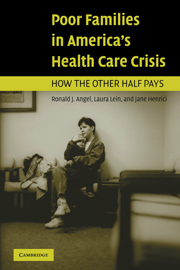Book contents
- Frontmatter
- Contents
- Preface
- Poor Families in America's Health Care Crisis
- 1 The Unrealized Hope of Welfare Reform: Implications for Health Care
- 2 The Health Care Welfare State in America
- 3 The Tattered Health Care Safety Net for Poor Americans
- 4 State Differences in Health Care Policies and Coverage
- 5 Work and Health Insurance: A Tenuous Tie for the Working Poor
- 6 Confronting the System: Minority Group Identity and Powerlessness
- 7 The Nonexistent Safety Net for Parents
- 8 Health Care for All Americans
- References
- Index
5 - Work and Health Insurance: A Tenuous Tie for the Working Poor
Published online by Cambridge University Press: 25 July 2009
- Frontmatter
- Contents
- Preface
- Poor Families in America's Health Care Crisis
- 1 The Unrealized Hope of Welfare Reform: Implications for Health Care
- 2 The Health Care Welfare State in America
- 3 The Tattered Health Care Safety Net for Poor Americans
- 4 State Differences in Health Care Policies and Coverage
- 5 Work and Health Insurance: A Tenuous Tie for the Working Poor
- 6 Confronting the System: Minority Group Identity and Powerlessness
- 7 The Nonexistent Safety Net for Parents
- 8 Health Care for All Americans
- References
- Index
Summary
Despite the fact that most of the mothers on welfare we interviewed expressed a desire to work and to support themselves and their families, the reality of work in the low-wage service sector made self-sufficiency almost impossible. Many mothers in our study found that employment increased the difficulties they faced in maintaining a stable home life, and it frequently meant the loss of Medicaid. The objective of any rational welfare policy is to encourage work and to promote economic self-sufficiency and family stability. However, as we learned, in combination with the insecurities of low-wage work, the bureaucratic structures and rules that govern public support programs are often irrational and undermine the objectives they are intended to promote. In reality, few of our respondents were better off working than on welfare, yet most attempted to find employment whenever and wherever they could. Of course, as a result of welfare reform, they were required to do so, but most clearly would have preferred self-sufficiency over welfare dependency. The case of one young African American mother of four children illustrates many aspects of the work-related difficulties our respondents faced.
Sarah
Sarah, who we introduced in Chapter 2, had four children that ranged in age from three months to eight years. We conducted our initial interview in the family's small apartment, which was located in “The Courts,” an old housing project close to downtown San Antonio.
- Type
- Chapter
- Information
- Poor Families in America's Health Care Crisis , pp. 101 - 128Publisher: Cambridge University PressPrint publication year: 2006



